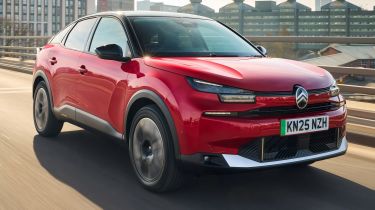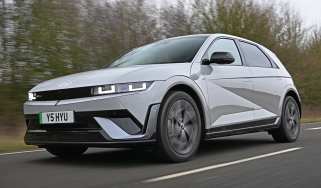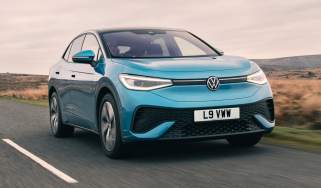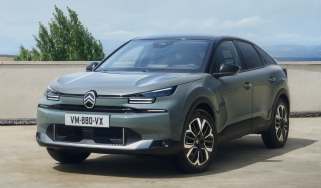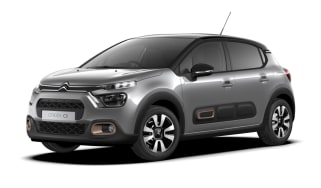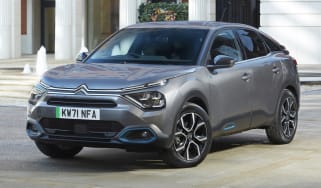Citroen e-C4 review – even more affordable facelifted EV
"The Citroen e-C4 hatchback is a stylish electric car that's safe, practical and comfortable"
Pros
- Comfortable
- Cheap to run
- 100kW charging
Cons
- Sluggish performance
- Mediocre range for 50kWh version
- Older battery technology
Verdict – is the Citroen e-C4 a good car?
The Citroen e-C4 is one of only a handful of genuinely affordable and good-value electric cars currently on sale – following its facelift, it’s even moreso, too. You’ll still pay quite a bit more than the equivalent petrol version, but if you can charge at home then the savings could be considerable. It’s good to drive, super comfy, and even pretty practical. The e-C4 is a great starter-EV, but even seasoned electric-car drivers could see merit in the French hatchback’s quirky personality.
Citroen e-C4 models, specs and alternatives
The Citroen e-C4 is the brand’s mid-size electric family hatchback – while it used to be the brand’s smallest EV, that space has been taken by the latest e-C3. You get a lot of car for the money with the e-C4, so it’s on par with cars from the segment above in terms of size.
Since the e-C4 launched, the electric car market has moved on significantly, and in 2025 the e-C4 received a facelift to keep it competitive – most importantly, though, it dropped hugely in price, now starting from just over £26,000. In fact, the e-C4 is £600 cheaper than a Vauxhall Corsa Electric, a supermini which sits in the class below the e-C4. On paper, then, the latest e-C4 already makes a lot of sense.
 The 10 best electric cars in 2025
The 10 best electric cars in 2025
As part of the facelift, the e-C4 also got a refreshed design. Now it sports the brand’s latest retro-inspired logo, and the wacky, angular headlights and tail-lights have been toned down with a more horizontal look giving it a closer resemblance to the e-C3.
More reviews
On the inside the changes are more subtle, and the only real noticeable difference is Citroen’s new logo on the steering wheel. There are new ‘Advanced Comfort’ seats, which offer more support, especially on the sides – that’s a welcome addition, because it was easy to slide around in your seat when cornering in the old car. The seven-inch digital driver’s display on all but the base ‘You’ trim is also new and looks brighter than before.
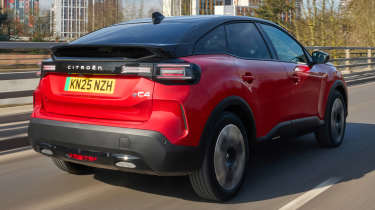
There’s not much new under the skin, however – the e-C4 already received an update in May 2023, which brought a higher-capacity 54kWh battery and more efficient 154bhp electric motor as used in the Vauxhall Astra Electric and Peugeot E-308, providing a range of up to 254 miles in the e-C4. The older, cheaper 50kWh option is still offered on the entry-level You and mid-range Plus models, providing up to 222 miles of range. What is new is the vehicle-to-load (V2L) tech, which allows you to power external devices with the car’s battery.
The e-C4 will charge at up to 100kW, which is largely competitive in this area of the market, and results in a 10-80% charge in around half an hour using a suitably fast rapid charger.
The e-C4 isn’t the fastest car in its class, but plentiful torque reserves mean it feels nippy around town. The 0-62mph sprint in the 134bhp version takes exactly 10 seconds, while top speed – not that it really matters – is limited to 93mph. The 154bhp motor offered on Max cars does the same sprint in 9.2 seconds, despite coming with a slightly larger, heavier battery.
Trim levels now comprise You!, Plus and Max models, with all cars getting rear parking sensors, dual-zone climate control, a 10-inch touchscreen infotainment system, 18-inch alloys and LED headlights. Plus adds features like a head-up display, a parking camera, sat nav and a larger seven-inch digital driver’s display compared with the entry-level car’s 5.5-inch system.
Go for a top-spec Max model, and aside from the larger battery, more potent motor and everything standard on lower-spec models, you’ll also get front parking sensors, a heated steering wheel, keyless entry and go, adaptive cruise control, traffic sign recognition, adaptive headlights and blind spot detection among other features to make driving even easier.
Range, charging & running costs
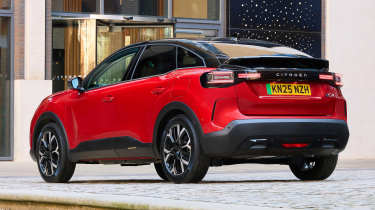
The Citroen e-C4 is more expensive to buy than a petrol version but the cost savings begin as soon as you arrive home from the showroom. If you find a good off-peak energy tariff to charge the e-C4 via a home wallbox charger, you could save a lot of money compared with filling up a petrol C4.
The e-C4 can travel for up to 222 miles for the 50kWh battery option, or 254 for cars with the 54kWh battery in ideal conditions (the slightly slipperier e-C4 X will do a couple of miles more) which is a little shy of rivals like the Volkswagen ID.3 58kWh (265 miles) or Kia Niro EV’s 288 miles.
Charging speeds are competitive, and the Citroen’s 100kW peak should be able to go from 10-80% in around 30 minutes. Charging the battery will take around 7.5 hours using a 7kW wallbox; an 11kW on-board charger is optional – but beware, as your home or place of work will need three-phase electrics to make use of this.
VED (road tax) is no longer free for electric vehicles, so the e-C4 will cost the standard rate. Happily, because it costs well below the £40,000 threshold, you won’t have to pay for the luxury car surcharge during the second to sixth years of the car’s life. It's business drivers who potentially stand to make the biggest savings. That's because Benefit-in-Kind liability for company-car drivers is based on CO2 emissions, which are zero for the e-C4, cutting bills compared with petrol, diesel and even hybrid models.
Electric motor, drive & performance
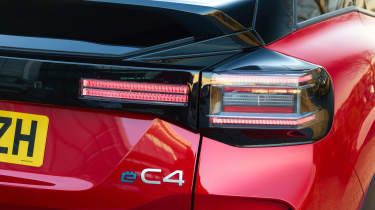
Following its facelift for 2025, the Citroen e-C4 was kept very much the same as before below the surface, and it drives very similarly as a result. ‘Advanced Comfort’ seats improve the car’s comfort, while extra side bolstering means you feel better supported overall.
The e-C4 comes with a choice of power outputs, the original 134bhp motor sending power to the front wheels, or from May 2023, an updated 154bhp motor shared with the Vauxhall Astra Electric and Peugeot. The 134bhp model gives it a 0-62mph time of 10 seconds, which is a bit slower than most rivals. With the more potent 154bhp motor you can expect a 0-62mph time of 9.2 seconds.
The e-C4 is perfectly fine around town, with a punchy response at low speeds. It’s only as you approach rural or motorway speeds that the Citroen seems to run out of puff. But this is a car that prioritises comfort over a sporty drive, so we’ve few complaints regarding outright performance.
That focus is summed up by Citroen’s suspension system, which is perfectly suited to UK roads – taking the edge off rough surfaces and giving the car a relaxed feel. We think the e-C4 is the smoothest-riding car in the class. Happily, despite its supple setup, the e-C4 mitigates body roll, so it’s not wallowy. Admittedly, the steering is very light, which is good around town but means it’s not particularly fun on a twisty road.
The e-C4 gets a 'B' mode that increases the amount of regenerative braking, so the driver can put more energy back into the battery and avoid using the brakes so much in town. It doesn’t offer one-pedal driving, but the system is intuitive enough to use.
Interior & comfort
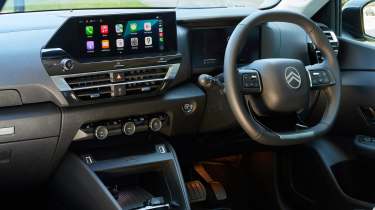
Interior quality took a bit step up compared with the previous-generation C4, though not much has changed since the facelift in the latest e-C4, aside from revised trims and the latest Citroen logo on the steering wheel. It gets technology like a standard 10-inch infotainment screen and digital instrument display, which help the Citroen feel modern and slick. All cars get Apple CarPlay and Android Auto compatibility.
Speaking of the infotainment system, while it’s hardly the most cutting-edge – look towards Kia and Hyundai for that – it’s more responsive than Volkswagen’s current offering.
Elsewhere, there are plenty of neat touches dotted around the interior, like the practical centre console, places to keep your smartphone, and the novel tablet holder for the front passenger. We're also glad there are attractive and logical dials for the climate control, so you don’t need to dive into the touchscreen just to adjust the temperature; another area where the Citroen triumphs over the VW.
There are three trim levels to choose from following the facelift: You, Plus and Max. Even entry-level versions are fitted with 18-inch wheels, a 10-inch infotainment screen, dual-zone climate control and rear parking sensors. Step up to Plus and you’ll get a head-up display to help keep your eyes on the road when checking your speed and other information, a reversing camera, 3D navigation and a larger seven-inch driver’s display compared with the entry-level car’s 5.5-inch unit. Top-spec Max cars not only benefit from the larger battery and more potent motor, but also get front and side parking sensors as well as the rear ones, a heated steering wheel, keyless entry and go, and a suite of driver assistance systems like adaptive cruise control, blind spot monitoring and more.
Practicality & boot space
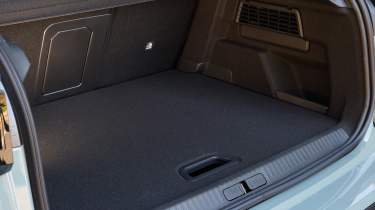
While you don't sit quite as high in the e-C4 as you do in a regular SUV, the driving position is slightly more commanding than in the Volkswagen ID.3. Citroen has also prioritised seat comfort, so the e-C4 should be good for longer trips – even if the range doesn’t quite lend itself to motorway driving.
Space up front is adequate for tall adults, while rear headroom may appear limited by the sloping roof but isn't actually too bad. Proper rear doors and more knee room make it better for rear passengers than the Mazda MX-30, too.
There's 380 litres of space in the e-C4's boot, which matches the Volkswagen Golf and is just five litres off the ID.3. It also matches the petrol and diesel versions of the C4, which is possible because the platform was intended for use as the basis of electric models from the off. One small gripe is the quirky rear spoiler, which may reduce drag but also cuts rear visibility by covering the bottom of the rear window.
Reliability & safety
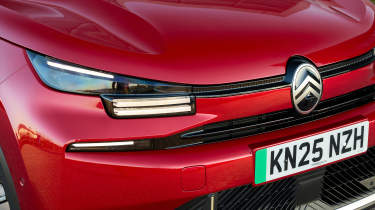
The electric motor and battery setups in the Citroen e-C4 are well tried and tested at this point, having featured in a number of related cars such as the Vauxhall Corsa Electric and Peugeot E-208. We’re yet to hear of any horror stories so we’d expect the e-C4 to be a reliable car.
In the Driver Power owner satisfaction survey, the brand came in an impressive fifth place out of 32 manufacturers in 2024. Buyers consider Citroen’s cars to have low running costs – something that should be even truer of an electric model – and think its cars offer brilliant value for money. The brand’s lowest scores were for exterior styling, which is rather subjective, and it wasn’t rated very highly for how its cars drive. However, an impressively low 15.1% of Citroen owners reported having an issue with their car within the first year – even less than the 18.1% proportion of Toyota owners in the same boat.
The e-C4 is fitted with a long list of safety equipment but that wasn’t enough to obtain a five-star Euro NCAP safety rating. While its adult and child protection scores were good, its 57% score for pedestrian protection let it down. Technology includes adaptive cruise control that can stop and then set off again in traffic, blind-spot detection and autonomous emergency braking.
